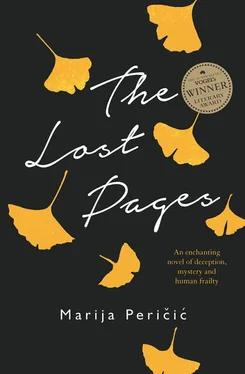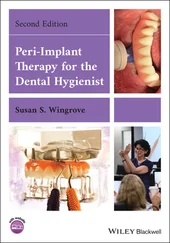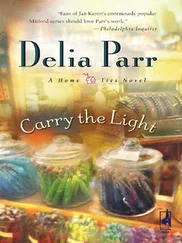Franz shrugged. ‘Oh, something happened. Things get in the way—you know how it is.’
I didn’t know, but I didn’t say anything. Theodor must be furious, I thought with glee. I pictured his shiny face, boiled red with rage from watching the empty doorway and the hands of his watch creep around and around.
The sour weight that Franz had brought with him suddenly lifted. Surely, Theodor would not allow himself to be treated with such scorn. In a few weeks he would have forgotten all about Franz, and by then I would have made great progress on my Schopenhauer book. And even if I had been nervous at the end with Fräulein Železný, it did not matter: she had still encouraged me to call on her. She had said yes. To me she had said yes, but she had only laughed at Franz. Perhaps Franz was nothing to worry about after all. He was only a little fly, an insect buzzing around the room: annoying, perhaps, but soon gone.
‘Yes, I know how things get in the way,’ I said, ‘but don’t worry. Theodor is a very understanding man. I’m sure he won’t mind at all.’
ANJA, ANOUŠKA, ANJALEIN: IN THE NEXT DAYS AND WEEKS, SHE was all I could think about, and I remember nothing of that time but her. I think those weeks were the happiest of my life. I found a contentment and joy that went far beyond mere attraction.
When I went to call on her for the first time my nerves were so great that I had to walk past her house twice before I could bring myself even to knock at the door. Her house was on the Martinsgasse, a street that was familiar to me; I had passed along it many times on my way to or from work, though I had never really noticed it before. Now it had become the centre of Prague; the most beautiful street in the city. The sunlight was brighter there, the air fresher and the birds more musical. A hush fell around me as I approached her house, as though behind its curtained windows invisible watchers stood, holding their breath. I rang the bell and automatically began to count in my head as I waited, a nervous habit of mine. My sweating palms were beginning to leave damp stains on the wrapper of the bouquet that I held out in front of me like a sword.
The maid let me in and showed me to the living room, where Frau Železný greeted me. She was tall and thin, a faded version of her daughter, with the same long hands and graceful neck. I handed her the bouquet and immediately felt purposeless and naked without it. Frau Železný busied herself with the flowers, which allowed her to surreptitiously observe me with little darts of her sympathetic eyes; I wondered if Anja had forewarned her family about my deformity. Frau Železný talked inconsequentially about varieties of flowers and the difficulty of raising this or that strain in the climate of Prague. I perched on a tightly upholstered chair opposite her and worried about what to do with my hands now that the bouquet had been taken from me. I folded them in my lap, and they lay heavy there, sweating like bony hams.
Herr Železný now entered the room together with the maid, who was pushing a trolley on which the afternoon coffee was arranged. In her father I could see nothing of Anja. He was dark and stern, with a bald spot on the very top of his head that was wreathed around by wiry hair. He shook my hand, keeping his eyes trained on mine as though he had been told not to stare, but at the same time not to avoid looking at me. My eyes were the first to fall. He lowered himself into a large armchair by the fire and seemed to get straight down to business, asking me about my position at the post office and my writing, some of which, to my surprise, he had read.
I balanced as upright as I could in my hard chair. I had to concentrate very hard on holding my cup and plate balanced so as not to disgrace myself by dropping anything on the carpet. I managed to get my coffee down, but the cake crumbs stuck unpleasantly to the walls of my dry throat. Eating and drinking and then also talking at the same time suddenly seemed an immensely complicated task, requiring great dexterity and skill. Sweat prickled under my collar.
After a short while, Anja appeared, wearing a blue dress that rustled like tissue paper. I stopped talking and looked at her as she stood, framed in the dark doorway, light falling on her hair, her fingers resting lightly on the door handle. It was like when one sees a deer step out of a wooded area into a clearing and time stops for a moment. We looked at each other. Then she came into the room and sat down on the little sofa next to her mother. Herr Železný was now explaining the content of my first novel to Frau Železný as though I were not in the room, so I was free to let Anja take my attention. She reminded me of a bird with her quick, darting movements, her head turning from side to side. Her slender hands were like fluttering leaves and the shapes they described in the air awakened a tinkling tune in my head.
I must have satisfied Herr Železný, because after he had finished his coffee and risen from his chair to leave the room he turned first to me and then to Anja, with a little bow, and asked us if we might like to go out on a walk together. Then he gave one sharp nod and left the room.
Walking down the stairs, I was finally able to relax. The soft sounds of Anja walking behind me—the rustle of her dress, her gentle footfalls and the hiss of her palm over the bannister—caused a pleasant tingling in my scalp and ears.
Out in the street she took my arm. I let my fingers brush the back of her hand as it nestled in the crook of my elbow, and it was so soft and yielding that when I brushed my fingers over it they seemed to pass through the skin.
Walking with Anja was a completely difference experience to walking alone. Over the years I had become used to people looking at me wherever I went and I had learned to ignore their rigid faces and round eyes. With Anja beside me I was surprised to find that people looked at us even more, but with a completely different gaze. At first it was as though my happiness had transformed either myself or the world, and I was met by only smiling faces, but then I slowly realised that the eyes that would usually be hooked by my outlandish form now slid past me, without taking me in, to light instead on Anja. Women, especially older ones, smiled at her with a kind of nostalgia, men’s eyes snapped over to her apparently of their own volition, and children looked with upturned faces as though they were watching a fireworks display. I walked like a ghost beside her, invisible but happy, seeing my joy reflected in the faces of those we passed.
We went to the Laurenziberg and wandered for a long time through the gardens that covered the eastern slopes. I was aware of the beauty of the gardens and the views of Prague without really seeing them. But the sky I took notice of. I can still recall precisely how it looked that day as we stood and gazed down on the city. It ranged over us in a broad sweep, the blue deep and full directly over our heads but stretched thin and pale at the horizon. There were some insignificant clouds, like wreaths of smoke, and Prague too was nestled in a hazy smudge of dust and sun, shot through with flecks of white as light glinted from the windowpanes and the surface of the river. Faint sounds of the city drifted up to us, the shouts of children and the whistle of a distant train. Looking back now, this afternoon seemed to have been suspended in a golden mist, held out of time like a leaf in amber.
We wandered to a seat and sat together. Anja looked around at the view, and exclaimed at the sun and the colour of the leaves and grass. I could only see these things in relation to her: how the sun gilded the skin of her face with a layer of iridescence, or how the greenery saturated the colour of her hair and eyes.
Читать дальше












